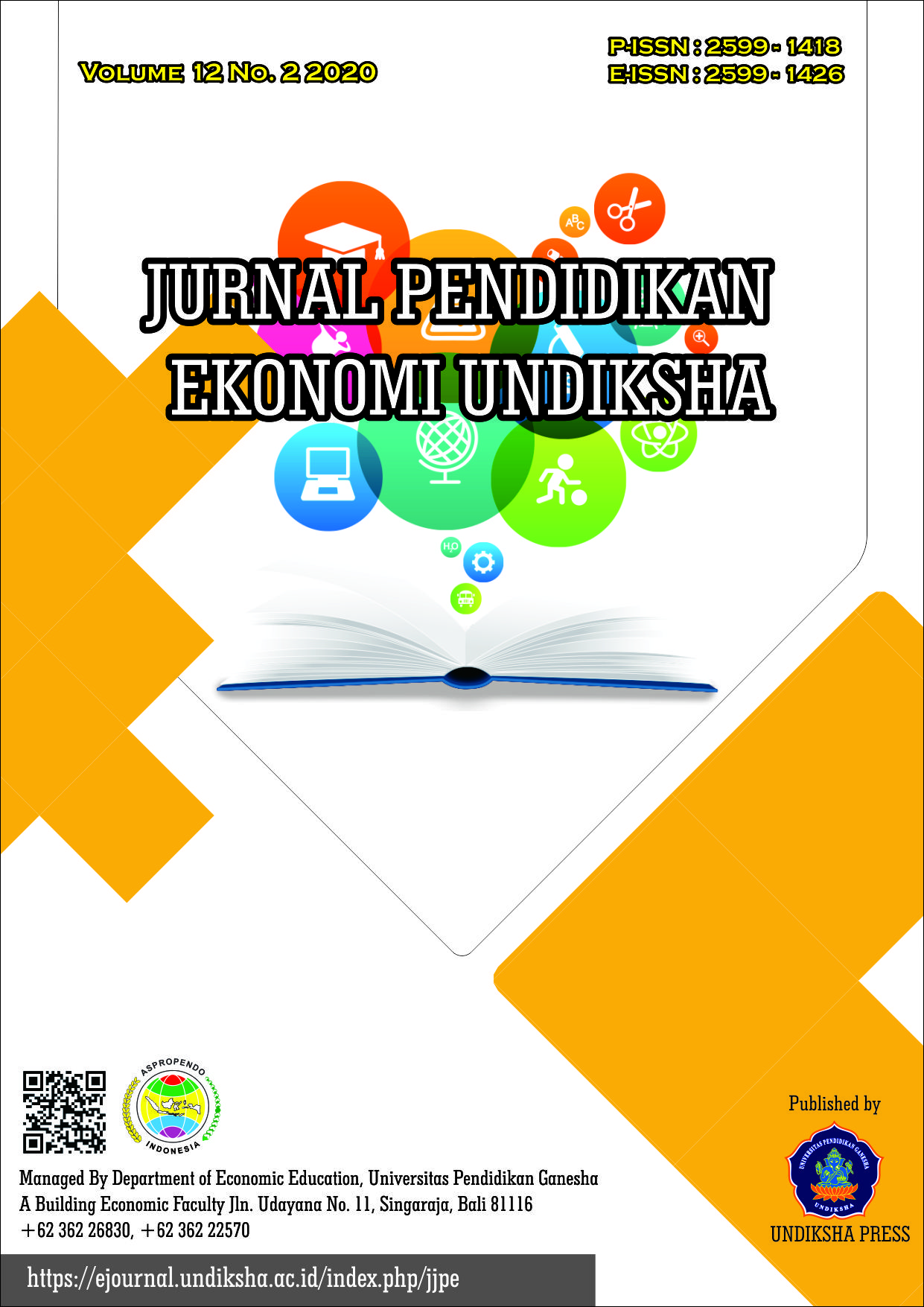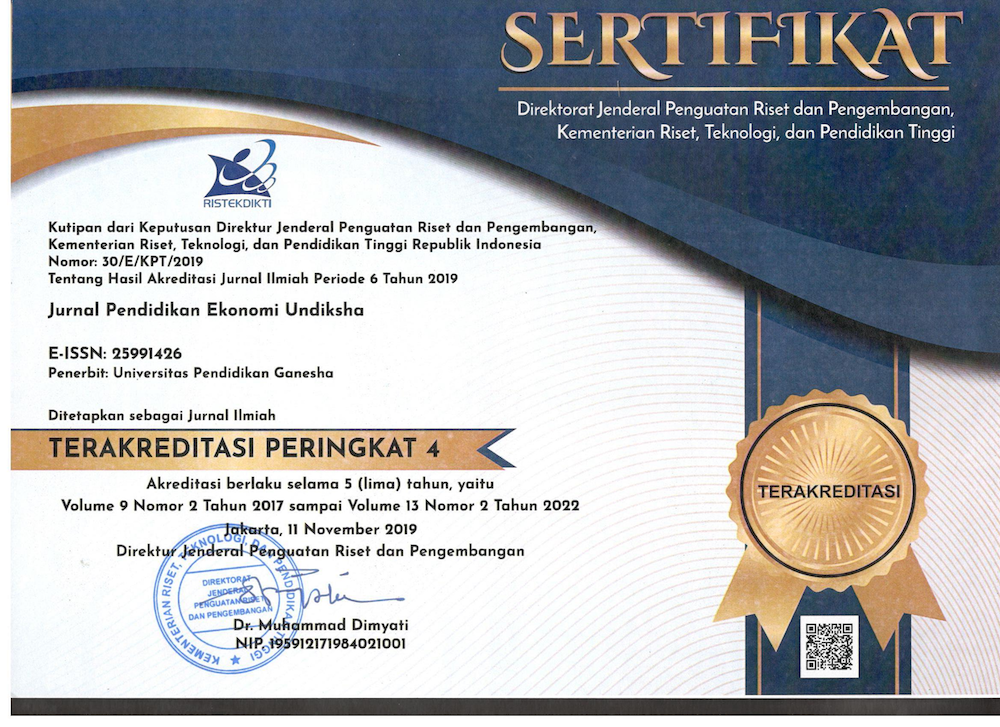Basic Economics Knowledge of Prospective Economic Teachers in Surabaya: Based on Their Background
DOI:
https://doi.org/10.23887/jjpe.v12i2.29786Keywords:
basic economics, economics, teacher candidateAbstract
Surabaya is the second-largest city in Indonesia. There is great hope for prospective teachers in Surabaya to have high credibility because their salaries are equivalent to the City Minimum Wage. The salary is the largest when compared to other cities in East Java province. The favorite field of science in social science is economics. However, to determine the basic economic knowledge that students will have in schools properly, it is the economics teacher who plays a big role. So it is necessary to research economic knowledge for prospective economics teachers before they become actual teachers. This study aims to determine how deep the basic knowledge of economics is in students of the Economic Education study program in Surabaya, where they are prospective economics teachers. This research method applies descriptive statistical methods. The survey was conducted on 338 students who are prospective economics teachers. There are only two Economic Education study programs in Surabaya, namely the State University of Surabaya (Unesa) and the IKIP Widya Darma Surabaya (IWIDA). All populations in this study were used as samples. The results showed that Unesa was indeed superior in understanding basic economics. The most important implication is that Unesa needs to pay special attention to prospective economic teachers who are female, come from private schools, come from outside the city of Surabaya, and come from SMK. Meanwhile, IWIDA needs to pay special attention to prospective economic teachers who are female, come from private schools, come from Surabaya, and come from MA.References
Andriani, P. 2010. “Pengaruh Asal Sekolah Dan Jurusan Terhadap Hasil Belajar Pengantar Dasar Matematika Mahasiswa Fakultas Tarbiyah IAIN Mataram.” Jurnal Βeta 3(2):118–33.
Di Girolamo, Amalia, Glenn W. Harrison, Morten I. Lau, and J. Todd Swarthout. 2015. “Subjective Belief Distributions and the Characterization of Economic Literacy.” Journal of Behavioral and Experimental Economics 59:1–12.
Hafidz, Alifudin Abdul. 2019. “Pengaruh Jenis Kelamin Terhadap Hasil Belajar Matematika Siswa.” Jurnal Ilmiah Matematika Dan Pendidikan Matematika 9(2):69–72.
Harewood, Anna Mary. 2014. “Exploring Gender Definition in Recent Sociological Scholarship.”
Henry S, Shryock. 2016. “The Natural History Of Standard Metropolitan Areas.” American Journal of Sociology 63(2):163–70.
Indriyani, Ratna. 2014. “Pengaruh Asal Sekolah Dan Tempat Tinggal Terhadap Prestasi Belajar Mahasiswa.” Wiraraja Medika : Jurnal Kesehatan 4(1):34–39.
Jappelli, Tullio. 2010. “Economic Literacy: An International Comparison.” Econstor 2010/16:1.
Jhon Harkesandi Sihotang, Achmad Rante, and Christiana Niken Suparman. 2018. “Studi Perbandingan Model Pembelajaran Dan Jenis Kelamin Terhadap Hasil Belajar Kognitif Peserta Didik Kelas X Ipa Sma Negeri 2 Manokwari.” Jurnal Nalar Pendidikan 6(2):120–27.
Koshal, Rajindar K., Ashok K. Gupta, Anita Goyal, and Vimal Navin Choudhary. 2008. “Assessing Economic Literacy of Indian MBA Students.” American Journal of Business 23(2):43–52.
Nenny, Hendajany. 2016. “The Effectiveness Of Public vs Private Schools In Indonesia.” Journal of Indonesian Applied Economics 6(1):66–89.
Phillips, Susan P. 2005. “Defining and Measuring Gender: A Social Determinant of Health Whose Time Has Come.” International Journal for Equity in Health 7(101147692):1–7.
Lo Prete, Anna. 2013. “Economic Literacy, Inequality, and Financial Development.” Economics Letters 118(1):74–76.
Putra, Rizka Eka, and Abdul Muin Sibuea. 2016. “Pengaruh Strategi Pembelajaran Dan Jenis Kelamin Terhadap Hasil Belajar Bahasa Indonesia Siswa Kelas Xi Sma Negeri 1 Tanjungtiram.” Jurnal Teknologi Pendidikan (JTP) 9(1):2407–7437.
Rafsanjani, Mohamad Arief, Ni’matush Sholikhah, and Albrian Fiky Prakoso. 2019. “Does the ‘Idaman Jelita’ Character of Universitas Negeri Surabaya Influence Students Economics Literacy?” Dinamika Pendidikan 14(2):205–15.
Salemi, Michael K. 2005. “Teaching Economic Literacy: Why, What, and How.” International Review of Economic Edcation 4(2):46–57.
Walstad, William B., Ken Rebeck, and Roger B. Butters. 2010. Basic Economics Test. Third. New York: Council for Economic Education.





